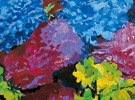1. Dennis Altman,Global Sex (Chicago: University of Chicago Press, 2001); Jon Binnie, The Globalization of Sexuality. (London: SAGE, 2004); Arnaldo Cruz and Martin F. Manalansan. Queer Globalizations: Citizenship and the Afterlife of Colonialism, Sexual Cultures. (New York: New York University Press, 2002).
2. Jurgen Habermas,The Structural Transformation of the Public Sphere: An Inquiry into a Category of Bourgeois Society (Cambridge: Polity Press, 1992); Michael Warner, Publics and Counterpublics (New York: Zone Books 2002).
3. 关于音译:我在涉及到中文词语、姓名、短语时使用汉语拼音,除了那些习惯上的发音拼写除外(例如,“周华山”没有按照汉语拼音书写,而是写作Chou Wah-shan)。中文姓名按照中国习惯的顺序来书写,姓在前,名在后。
4. 在本文中,我使用同性性欲(homoeroticism)、同性性爱(same-sex eroticism)、同性之情(same-sex intimacy)、同性恋(homosexuality)、男同性恋(gay)、同志(tongzhi)、酷儿(queer)、LGBTQ来指涉不同原因下的同性爱欲。大体来说,在前现代中国语境下,我使用同性性欲、同性性爱、同性之情,但在更广泛的意义上来说,这些词并不指示任何固定的现代身份类型。我使用同性恋、男同性恋、同志、酷儿、LBGTQ来指涉具体历史社会环境下的同性欲望,并且我将通过一种历史方法来指明在本文中做这种区分的必要性。
5. Adrian Carton, “Desire and Same-Sex Intimacies in Asia,” in Gay Life and Culture: a World History, ed. Robert Aldrich (New York: Universe, 2006), 303.
6. 男性之间的平等主义的同性恋在前现代中国也可以找到。它基本都发生在宫廷文化和文人圈子中,并且以男人之间的友谊或者兄弟情谊的方式而存在。见Bret Hinsch, Passions of the Cut Sleeve: the Male Homosexual Tradition in China (Berkeley: University of California Press, 1990), 13.
7. 对于这些历史轶事的解释,可见Hinsch, Passions of the Cut Sleeve, 20-54; 张在舟,《暧昧的历程:中国古代同性恋史》(郑州:中州古籍出版社,2001),10-11.
8. 关于在中国语境下“性行为”与“性身份”之间的区别可见Song Hwee Lim in his Celluloid Comrades: Representations of Male Homosexuality in Contemporary Chinese Cinemas (Honolulu: University of Hawai’i Press, 2006), 7-13. “性行为与性身份之间的区别并不完全是指前者是‘做什么’,后者是‘是什么’(借用Hirsch的话),相反,行为与身份这两个概念必须被视为性话语的效果,而不仅仅只是被它区分开,并且性话语使这一区分发生松动,并将其划清界限,使其彼此独立。” (Lim, Celluloid Comrades, 9, 重点为原文所加)
9. 关于前现代中国对于同性恋的宽容,可见刘人鹏(Liu Jen-peng ),丁乃非( Ding Naifei), “Reticent Poetics, Queer Politics,” Inter-Asia Cultural Studies 6, no. 1 (2005): 30-55; Fran Martin, Situating Sexualities: Queer Representations in Taiwanese Fiction, Film and Public Culture (Hong Kong: Hong Kong University Press, 2003), 32-33; 201-203;233-234; 张在舟,《暧昧的历程》(郑州:中州古籍出版社,2001)。
10. 关于女同性恋的历史记录很少,可见Hinsch, Passions of the Cut Sleeve, 173-178; Tze-lan D. Sang, The Emerging Lesbian: Female Sex-Sex Desire in Modern China (Chicago: the University of Chicago Press, 2003), 37-95.
11. Carton, “Desire and Same-Sex Intimacies in Asia”, 309-311.亦可见Charlotte Furth, A Flourishing Yin: Gender in China’s Medical History (Cambridge, M.A.: Harvard University Press, 1998); Robert Hans van Gulik, Sexual Life in Ancient China: A Preliminary Survey of Chinese Sex and Society from ca 1500 B.C. till 1644 A.D. (Leiden: E.J. Brill, 1974).
12. 关于西方对中国同性恋传统的破坏,可见小明雄《中国同性爱史录》(香港:粉红三角出版社,1984);周华山,Tongzhi: Politics of Same-Sex Eroticism in Chinese Societies (New York: the Haworth Press, 2000), 42-55. 刘人鹏,丁乃非,“Reticent Poetics, Queer Politics,” 30-55; Fran Martin, Situating Sexualities.
13. 在后毛时代的中国大陆,对于前现代时期作为性艺术的性与性欲的学术重构是与日益高涨的民族主义和脱离过去的毛泽东主义的意识紧密相连的。见Judith Farquhar, Appetites: Food and Sex in Post-Socialist China (Durham, Duke University Press, 2002), 243-284.
14. Sang, The Emerging Lesbian, 23.
15. 性科学和性艺术是米歇尔•福柯(Michael Foucault)的术语,用来指称对于性经验的不同理解方式。见Michel Foucault, The History of Sexuality, vol. 1. (London: Penguin Books, 1990), 51-73.
16. Sang, The Emerging Lesbian, 99-126.
17. Wenqing Kang, Obsession: Male Same-Sex Relations in China, 1900-1950. (Hong Kong: Hong Kong University Press, 2009).
18. Howard Chiang, “Epistemic modernity and the emergence of homosexuality in China,” Gender and History, 22, no. 3. (2010).
19. “鸡奸”是从前现代中国的法典借用来的术语,并没有圣经中所指的意思。见郭晓飞,《中国法视野下的同性恋》(北京:知识产权出版社,2007),15-20. 关于“流氓”的详细解释,可见Michael Dutton, Streetlife China (Cambridge: Cambridge University Press, 1998), 62-75.
20. Emily Honig, “Socialist Sex: The Cultural Revolution Revisited,” Modern China 29, no. 2 (2003): 143-175.
21. 正如伊娃•赛奇维克(Eve Sedgwick)所说,酷儿表示的是“在所有人的性别或者所有人的性经验都不是统一的(或都不可能是统一的)时候,一切可能、差距、重叠、不和谐与和谐、过失、过度阐释都会发生。”见Eve Kosofsky Sedgwick, Tendencies (Durham: Duke University Press, 1993), 9.
22. 李银河和王小波,《他们的世界:中国男同性恋群落透视》(香港:天地图书有限公司,1992;太原:陕西人民出版社,1993);刘达临,《中国当代性文化:中国两万例性文明调查》(上海:三联书店,1992);张北川,《同性爱》(济南:山东科学技术出版社,1994);方刚,《同性恋在中国》(长春:吉林人民出版社,1995)。有关潘绥铭和鲁龙光的20世纪八九十年代同性恋研究,可见二人合著的《中国同性恋研究》(北京:中国社会出版社,2006),38-39.
23. 本文的重点主要是男同性恋身份,华语世界的女同性恋的相关信息可见Elisabeth Lund Engebretsen, “Lesbian Identity and Community Projects in Beijing: Notes from the Field on Studying and Theorising Same-Sex Cultures in the Age of Globalisation,” Permanent Archive of Sexualities, Genders, and Rights in Asia: 1st International Conference of Asian Queer Studies (2005), http://bangkok2005.anu.edu.au/papers/Engbretsen.pdf. (accessed June 1, 2010); Helen Hok-Sze Leung, Undercurrents: Queer Culture and Postcolonial Hong Kong (Vancouver: UBC Press, 2008); and Fran Martin, Backward Glances: Contemporary Chinese Cultures and the Female Homoerotic Imaginary (Durham: Duke University Press, 2010).
24. 1997年中国刑法删除了流氓罪,这在中国LGBTQ群体看来,标志着同性恋的“非罪化”。法律学者郭晓飞指出,所谓的同性恋“非罪化”只是删除流氓罪后的一个意外收获,其实关于同性恋合法化的问题并不是立法者的意图。他进一步指出,在中华人民共和国的法律条文中,同性恋从来不属于刑事犯罪,虽然在实际的执法过程中可能有所出入。关于中国法律中的同性恋问题,可详见郭晓飞的《中国法视野下的同性恋》(北京:知识产权出版社,2007);周丹,《爱悦与规训:中国现代性中同性欲望的法理想象》(桂林:广西师范大学出版社,2009)。关于同性恋的depathologization,第三版中国精神病分类目录规定,只有那些不能和自己的性身份达到“自我和谐”的人才需要心理和医学治疗。关于医学上的憎恶疗法治疗同性恋的例子,可见刘达临,鲁龙光的《中国同性恋研究》(北京:中国社会出版社,2005),231-328。
25. 关于中国当代LGBTQ群体的更多讨论,可见包宏伟(Bao Hongwei),“LGBT Issues in China,” in The Greenwood Encyclopaedia of LGBT Issues Worldwide, ed. Chuck Steward (Santa Barbara, CA: ABC CLIO, 2010): 355-73.
26. 除了gay、同性恋、同志,在中国当代还有其他类型的同性恋主体,例如,魏伟对于“飘飘”的研究,“飘飘”是中国西南部的城市成都本地的同性恋主体。见魏伟,《“流浪的人”不再流浪:中国当代成都本地同性恋身份的形成与变迁》(‘Wandering Men’ No Longer Wander Around: The Production and Transformation of Local Homosexual Identities in Contemporary Chengdu, China),选自《亚际文化研究》(Inter-Asia Cultural Studies)(八),2007年第4期,572-588.
27. 关于LGBTQ语境下“同志”术语的来源,可见Song Hwee Lim, Celluloid Comrades, 11-12.
28. 周华山,《同志》,1-9.
29. 高燕宁,《中国有同性恋吗?同志与男/女同性恋的跨文化比较》,选自Conference Proceedings of the National Conference on HIV/AIDS Prevention and Treatment among Men Who Have Sex with Men / the Tenth Anniversary Celebration of Friends Project/ Barry & Martin Prize-Giving Ceremony, ed. Friends Project (Qingdao: Pengyou xiangmuzu, 2009), 197.
30. 关于台湾同性恋身份的掩藏与现身的策略问题,可见Martin, Situating Sexualities, 187-235.
31. 我对于同志的身份政治的讨论是受到两种文献资料的启发:首先是关于非西方国家性问题的著作,包括Chris Berry, “Sexual Disorientations: Homosexual Rights, East Asian Cinemas, and Postmodern Postnationalism,” in Pursuit of Contemporary East Asian Culture, ed. Xaobing Tang and Stephen Snyer (oulder, CL: Westview Press, 1996);157-82; Chou Wah-shan, Tongzhi; Elisabeth Lund Engebretsen, “Queer Ethnography in Theory and Practice: Reflections on Studying Sexual Globalisation and Women's Queer Activism in Beijing,” Graduate Journal of Social Science 5, no. 2 (2008): 88-116; Loretta Wing Wah Ho. Gay and Lesbian Subculture in Urban China (London: Routledge, 2010); Travis Kong, Chinese Male Homosexualities: Memba, Tongzhi, and Golden Boy. (London: Routledge, 2010); and Lisa Rofel, Desiring China: Experiments in Neoliberalism, Sexuality, and Public Culture (Durham: Duke University Press, 2007). 其次是同性恋研究中有关性行为、同性恋社会性、血缘关系与性关系的那些著作,包括Lauren Berlant, Intimacy. (Chicago: University of Chicago Press, 2000); Judith Butler, Gender Trouble: Feminism and the Subversion of Identity (New York: Routledge, 1990); Elizabeth Freeman, The Wedding Complex: Forms of Belonging in Modern American Culture (Durham: Duke University Press, 2002); and Eve Kosofsky Sedgwick, Epistemology of the Closet. (Berkeley: University of California Press, 1990).
32. Dennis Altman, Global Sex (Chicago: University of Chicago Press, 2001).
33. Joseph A. Massad, Desiring Arabs (Chicago: University of Chicago Press, 2007), 160-190.
34. 关于中国同性恋群体的“素质”问题,可见Lisa Rofel, Desiring China, 85-110; and Loretta Ho, Gay and Lesbian Subculture in China, 89-97.
“我们觉得自己不同”:中国LGBTQ的身份与政治
作者:包宏伟 来源:品博艺术网 日期:2010-08-10
关键字:包宏伟,我们觉得自己不同,身份,政治
展览链接
相关新闻
- 09-10-05新历史主义绘画与历史意识——绘画的政治性解读
- 10-06-09“活化厅”—— 究竟是不是“艺发局最后悔的决定!”?
网友评论










